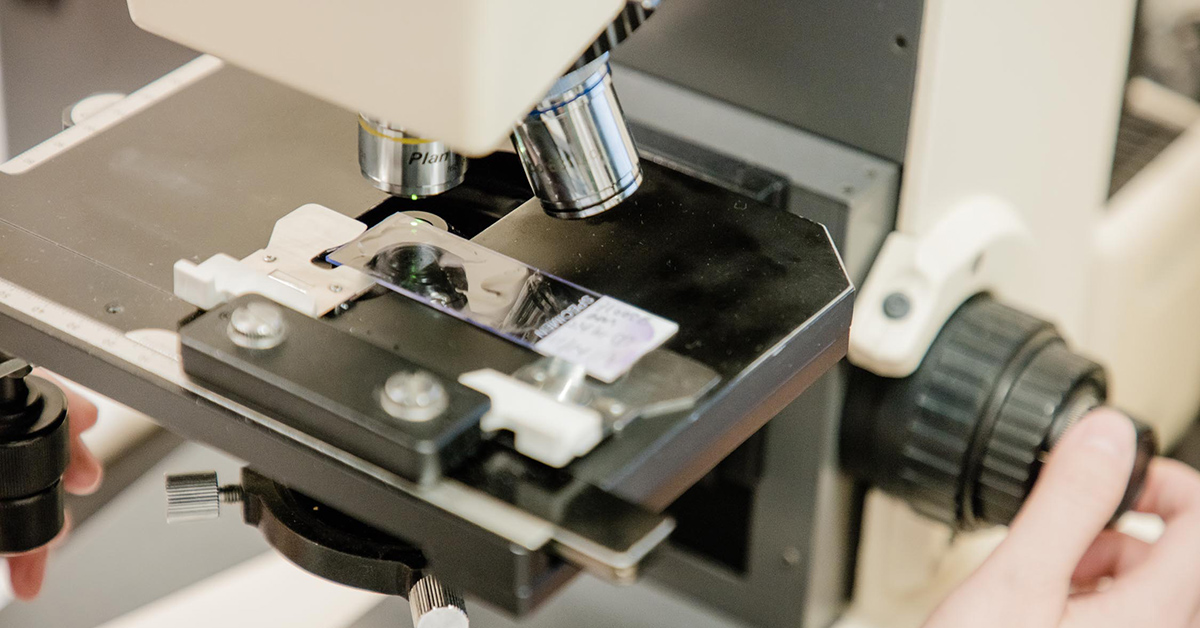
Pathologists: The Behind-the-Scenes Cancer Specialists And The Important Role They Play
-
A pathologist is an important part of every cancer care team. But chances are you don’t know much about these doctors or the crucial reports they write. Here are seven commonly asked questions about pathologists and their work.
Q: What is a pathologist?
A: A pathologist is a doctor who studies samples of body tissue under a microscope. Pathologists specialize in evaluating cells and tissues to diagnose diseases, including cancer. Then they write a medical document called a pathology report based on what they find.
“A patient’s life might change forever based on my report—it’s a big, big responsibility,” said Essel Dulaimi Al-Saleem, MD, a pathologist at Fox Chase Cancer Center. “We have to be very precise and specific, and that’s the challenging part of pathology.”
Q: What’s in a pathology report?
A: The document plays an important role in cancer diagnosis and staging. After the doctor biopsies a small portion of the tissue being tested for cancer, he or she sends the tissue sample to the pathology laboratory, where it gets processed and prepared for microscopic examination, one of the pathologists who will examine it to see if cancer cells are present. The pathologist then writes a report based on the morphological and other studies done on the tissue. The report will include:
- A description of how the specimen looks to the naked eye and how it looks under a microscope.
- Determine if there is a tumor.
- The type of tumor and its size, and features that determine how quickly the tumor is likely to grow and spread.Large organs excised by a surgeon are also examined by a pathologists to determine the stage of the disease
Q: Why can it take a while to issue a pathology report?
A: On TV medical shows, doctors look at a slide and immediately know the diagnosis and treatment. But real pathology is much more in-depth.
First, pathology technicians prepare the slides. Certain body tissues take extra time to prepare. Once the pathologist begins examining the samples, he or she may discover that special testing or more tissue is needed, or an additional expert needs to be consulted. Each cancer case is different, so the time it takes to get a report back can vary.
Q: How is the information in the pathology report used?
A: The report helps your cancer care team form a plan of action. Specialists from many areas review the findings in the report. Then they work together to develop a personalized treatment plan.
Q: Can I get a second opinion about my pathology report?
A: Absolutely. You can request a copy of your pathology report and your slides for review at another medical facility.
Pathology reports issued at Fox Chase routinely come with a second opinion built into them.
“I seek a second opinion on a daily basis,” Dulaimi Al-Saleem said. “We have a quality assurance meeting daily and interdepartmental meetings where pathology samples are discussed. If it’s a difficult case, more than one pathologist will look at it and confirm the diagnosis.”
Pathologists at Fox Chase also take a second look at slides prepared elsewhere and encourage patients to make a second opinion appointment with a clinician at Fox Chase to have the review implemented into the patient’s options for treatment.
“Any patient who comes to see our clinicians, part of the workup is that we request the old slides,” Dulaimi Al-Saleem said. “We review them and issue reports. Our clinicians give second opinions, and they include our opinion.”
Q: I’ve never met my pathologist. Is that unusual?
A: No. Pathologists typically work behind the scenes. But that doesn’t mean your pathologist isn’t an active member of your care team or only thinks of you as a sample under a microscope.
“Believe it or not, I get very emotional,” Dulaimi Al-Saleem said. “I get very attached to the patient because we review the clinic notes. I get emotionally invested in patients even though I don’t see them.”
Q: What should I know about the pathologists at Fox Chase?
A: All the pathologists are board-certified and experts in their particular field of pathology. Also, “the relationship between pathologists and clinicians at Fox Chase is excellent, and that’s the key to successful patient care,” Dulaimi Al-Saleem said. “We work as a team.”
